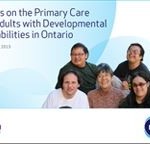
Background
We have posted extensively about the current state of knowledge around the health care needs of people with learning disabilities and the nature of the responses by UK health providers.
The Mencap Getting it Right campaign launched after the publication of Death by Indifference’, aims to support local campaigners, health professionals, GP surgeries, hospitals and healthcare authorities to work together to make improvements. The most recent report on progress shows some improvements, for example increases in the number of annual health checks, but also many examples of things not going so well, for example people still not being given information in a way they could understand, lack of recognition of when people were in pain and people not being included in key decisions about their care.
So we at the Elf were particularly interested to see the launch of a recent publication from colleagues in Ontario, Canada, An Atlas’ on Primary care of adults with learning disabilities in the region from the Health Care Access Research and Developmental Disabilities (H-CARDD) programme.
The Atlas grew out of a study of the health status and health care use of over 66,000 adults with learning disabilities across the province. Not surprisingly, the Atlas shows inequities faced by such individuals in access to health care.
Key Findings
- Prevalence of adults between the ages of 18 and 64 years of 0.78%, (higher than reported in previous work)
- A greater proportion of adults with learning disabilities were compared to the population of adults without learning disabilities more likely to live in poorer neighbourhoods and in rural areas when compared to the population without learning disabilities.
- They also had higher rates of morbidity and were more likely to be diagnosed with a range of chronic disease
- Adults with learning disabilities were more likely to visit emergency departments and be hospitalised when compared to those without learning disabilities, although there was a comparable use of general practitioners between the two groups.
- In Canada, there is a recommendation that individuals with learning disabilities get support through inter-professional Family Health Teams, but the study found this was only happening for 20%
- Only 22% of the cohort in the study were getting a periodic health examination and were less likely than the comparable group without disabilities to have recommend screening for three types of cancer.
- The rate of eye examinations for people with diabetes and learning disabilities was higher (63%) than for those without disabilities (57%).
- Almost half the cohort with learning disabilities had multiple medications at one time, with nearly a quarter having five or more.
- Nearly of fifth of those with learning disabilities who were prescribed anti-psychotic medications were found to have two antipsychotics concurrently, putting them at risk for adverse reactions
Conclusion
The authors conclude that the study found many gaps in care and therefore propose a number of key action to resolve some of the issues:
- Through the application of evidence and empirically tested best practices – Improve the quality of primary care
- Take actions to modify the broader health care system through better care planning and cross-sectoral collaboration, and coordination.
- Put patients, families, and caregivers at the centre of their care through fostering strong partnerships..
Link
Download the full report here: Health Care Access Research and Developmental Disabilities

“@WELDBlog: Atlas maps health of adults with learning disabilities in Ontario, Canada http://t.co/S0L2NcC8B1“